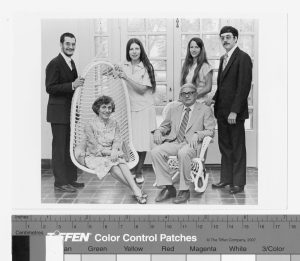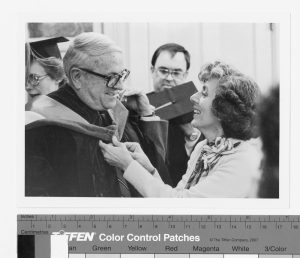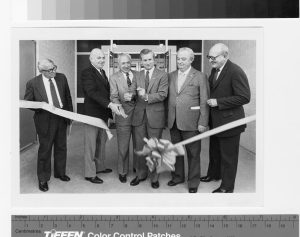
In 1983, Time magazine’s first issue departed from its traditional “Man of the Year” (now, “Person of the Year”) cover story and recognized instead, for the previous year, 1982, a “Machine of the Year,” the personal computer. While quaintly dated by contemporary 21st century standards, the 21-page cover story shocked many by prophesying the computer’s abiding relevance for the future. Time was not alone: globally, the nascent technological revolution was sparking a new wave of millenarian conversations about the nature of knowledge, ethics, and personal identity.
One month later, on February 4, 1983, ECU installed Dr. John McDade Howell (1922–2016), as its third chancellor, and East Carolina’s eighth chief executive officer (if former acting president Howard J. McGinnis is included). Unlike previous inaugural occasions, Howell’s was focused on the future, including humanity, the planet, and the cosmos. Echoing the earlier Time issue, a pervading theme was the computer revolution.
As had Leo W. Jenkins (1913–1989) before him, Howell emerged as the superlative candidate through his long service at East Carolina, rising during his 25-year tenure from its professorate along successive rungs of administrative power, earning the respect of his colleagues, the community, and the upper echelons of state higher education.
Unlike Jenkins, however, Howell, 61 when installed, had a limited horizon: from the start, he planned to retire in 1987, at age 65. And far from the busy week of inaugural events featuring the arts, drama, and music during Jenkins’ inauguration, Howell’s was briefer in span, modest in scale, and largely academic in content. Economic woes — the country remained in the grips of stagflation — made frugality a virtue. Equally relevant to the low-key nature of Howell’s inauguration was his devotion to scholarship and his belief that the university’s purpose was best exemplified in guiding progress along ethical lines.
Phi Kappa Phi’s Symposium on the New Millennium
Most uniquely, Howell requested that his inaugural ceremonies piggyback on the annual symposium held by the ECU chapter of the honor society, Phi Kappa Phi. Howell was one of its founders and a devoted member. The symposium, “Toward the New Millennium: Challenges and Dreams,” was scheduled for February 3–4, and included three sessions featuring paper presentations by eight ECU faculty and one student. Two sessions were held on Thursday, and the final one on Friday morning before the afternoon installation. Howell offered the welcoming remarks at the first session, held in the School of Nursing auditorium. His installation ceremony, held in Wright Auditorium, was billed as the symposium’s grand finale.
Aware of Time’s cover story, speakers repeatedly addressed the emerging impact of computers. SGA vice president, Bob Mills opened one session by “predicting the eventual abolishment of the university as a physical institution,” to be replaced in the next millennium by higher education at home, using computers and television. Chair of the Faculty, Carolina LeRoy Ayers, took a moderate approach, suggesting that computers would assist in the way knowledge is transmitted while still favoring the personal role of faculty.
UNC System President William C. Friday and Howell’s Installation
President of the UNC System, William C. Friday (1920–2012), presided at the installation. Friday told the audience that during the national search for a new chancellor, the search committee had found the best person for that position right on campus. Friday’s support for Howell was strong: when Howell’s predecessor, Thomas B. Brewer (1932–2018) resigned in controversy in the fall 1981, Friday soon recommended to the UNC Board of Governors that Howell be named interim chancellor, which he was.
Howell did not initially express interest in the chancellorship on a permanent basis, but he eventually allowed himself to be considered as a candidate and then, following a national search, was chosen by the UNC Board of Governors, again based on Friday’s recommendation. Earlier, the ECU Board of Trustees, after reviewing a pool of 148 applications, had forwarded the names of three finalists — including Howell’s — to the Board of Governors. Friday’s backing for Howell was, once again, decisive.
Friday, then 63, later explained that ECU could not have afforded the lag that would have followed if someone unfamiliar with the school had been appointed. Later, when asked about his plans as permanent chancellor, Howell responded that he had no intention of rearranging the administration as his predecessor had done and instead planned “to work with the people already here,” praising ECU and its potential for academic service. Friday wanted a caretaker chancellor devoted to academic excellence, and found that in Howell.
Friday knew Howell well from the latter’s 25 years at East Carolina. Howell had joined the faculty in 1957 as an associate professor in the Social Sciences Department. During the Jenkins’ era, he flourished as an administrator, first as chair of the Political Science Department (1963–1966), then as dean of the College of Arts and Sciences (1966–1969), next as dean of the Graduate School (1969–1973), and finally as vice chancellor for academic affairs (1973–1979). In 1979, with the administrative reorganization launched by Chancellor Brewer, Howell was prompted to step down from service as ECU’s chief academic officer to return to classroom teaching. Nevertheless, after Brewer resigned, Friday recognized Howell as ECU’s most talented, trustworthy veteran administrator and ensured, through consistent support, that Howell, would be named chancellor.
Gov. James B. Hunt, Jr.’s Remarks
Gov. James B. Hunt, Jr. (1937–), delivered the keynote address, praising Howell as a “scholar and gentleman — a man who will make things happen.” Hunt added that Howell was “dedicated to the advancement and well-being of this university and eastern North Carolina.” Hunt, himself a native of Wilson, N. C., observed with praise that “East Carolina University is planning for the new century by forging a special relationship between the university and the region.”
Hunt also praised the ECU Medical School for providing quality health care to the region, and the Schools of Art and Music for making Greenville a cultural center in the state. He added that the installation ceremony marked the beginning of a new era because Howell would guide ECU toward the next century. Adding his thoughts about the topic of the day, computers and the next century, Hunt noted how change is a constant element and that the future will bring “new technologies … and a host of problems and joys.”
Howell’s Inaugural Address
Speaking cautiously about “the new technologies,” Howell warned against what some called the “intimidation of technology,” reminding his audience that machines such as the computer were “to be handmaidens to our efforts yet [they] threaten to become our masters.” Howell added, “The computer or any other machine is an ethically neutral device…. We should not lose sight of the fact that computers … are an extension of the human brain.”
Howell observed that the brain, unlike the computer, can factor in things needed to correct problems. “The computer is not the ‘wonder of the world.’ There’s got to be a person there who puts them to use and draws conclusions on the evidence.” He noted that while patterned after the brain, computers lack artistic abilities, compassion, understanding, and altruism. He asked, “For what will it profit us to encode countless messages on one minute silicon chip if we have nothing of human value to inscribe thereon?”
Howell added, “In a period of technological advance we should not let the technical device invented confuse us into thinking that they are more important to the solution of human problems than the … human brain [is in] stimulating the minds of people.” He emphasized that while computers might help in solving problems, the human brain is our primary asset.
Howell’s inauguration coincided with a time of deep recession and exceptionally high interest rates. Worsening things for many, unemployment stood at 10.8 percent. Howell acknowledged the “crisis of conscience within society as to the worth of traditional higher education,” and bemoaned the fact that rather than working together to restore confidence, parts of the academy were attacking each other, exacerbating the crisis.
Howell suggested that “In the tight-money days we now face, we must reaffirm the belief in the value of a college education and show that universities do provide services to society that, in the long run, are worth more than the cost.” Also, universities must demonstrate that they are indispensable in our rapidly and everchanging technological society. Along with providing scientific knowledge, they must help preserve human values.
Howell added that the university is a human structure and “in harmony and trust amongst ourselves, we can convey to society at large our sense of commitment to the needs of future student generations, our immediate region, and the nation as a whole, restoring a sense of confidence.”
Howell acknowledged that projections of declining enrollments in the years ahead would challenge many schools, but he also envisioned better times in the 1990s when enrollments were expected to pick up. In the meantime, he warned that conflict-driven competition among schools for limited resources would be detrimental to higher education and so instead called for unity and common cause among the constituent institutions in the North Carolina System, and cooperation with private schools and community colleges.
Concluding the inaugural day, the ECU School of Music staged an evening concert featuring the Symphonic Wind Ensemble and Jazz Ensemble, conducted by professors of music, Herb Carter and George Broussard.
Later Thoughts
Reflecting on his inaugural program and the thanks owed to faculty, staff, and students for their contributions, Howell later remarked that “the university is valuable to society because it can take the ideas and expertise from a wide variety of disciplines and focus them on one problem.” While Howell’s installation and its thinking about computers and the approaching millennium now seems dated, especially in its silence about the next technological revolution, the internet, still it does establish that as the information age dawned, ECU was, in its own way, cognizant of and conversant about the transformation at a level of leadership and community engagement that remains impressive.
During his tenure as chancellor, Howell, true to his inaugural remarks, guided ECU away from competitive expansion and toward an era of cooperative consolidation aimed at realizing higher levels of excellence in newly established programs across the university. In many ways, his brief tenure helped ensure that the rapid growth of the preceding decades was brought to maturity in quality and stability.
Sources
Allegood, Jerry. “ECU’s Ethics Strong, Official Tells Graduates.” News and Observer. May 12, 1979. P. 26.
Allegood, Jerry. “New Chancellor Calls for Unity at East Carolina.” News and Observer. February 5, 1983. P. 11A.
Anderson, Diane. “Howell Interim Head.” East Carolinian. January 12, 1982. P. 1. https://digital.lib.ecu.edu/57448
Baines, Marianne. “Chancellor John M. Howell and Wife Gladys.” University Archives # UA55.01.1723. East Carolina University Digital Collections. J. Y. Joyner Library. East Carolina University. Greenville, N. C. https://digital.lib.ecu.edu/3147 and https://digital.lib.ecu.edu/1545
Baines, Marianne. “John M. Howell with Family.” Digitized photograph. University Archives # UA55.01.1714. J. Y. Joyner Library. East Carolina University. Greenville, N. C. https://digital.lib.ecu.edu/3146
Brown, Darryl. “Gov. Hunt Speaks at Chancellor’s Installation.” East Carolinian. February 8, 1983. Pp. 1, 3. https://digital.lib.ecu.edu/57532
Brown, Darryl. “Technology in Education: Computers Influence Debated.” East Carolinian. February 8, 1983. P. 1. https://digital.lib.ecu.edu/57532
“Comments by alumni president John Lennon at installation.” The ECU Report. March 1983. P. 1. University Archives # UA50.24.08.02. East Carolina University Digital Collections. J. Y. Joyner Library. East Carolina University. Greenville, N. C. https://digital.lib.ecu.edu/1623
“ECU Installs Howell as Chancellor.” Winston-Salem Journal. February 5, 1983. P. 18.
Forrest, Thomas J. “Chancellor Howell installation.” East Carolina Manuscript Collection # 0741-b45-ff. J. Y. Joyner Library. East Carolina University. Greenville, N. C. https://digital.lib.ecu.edu/15083
“Howell Speaks of Challenges.” The ECU Report. March 1983. P. 1. University Archives # UA50.24.08.02. East Carolina University Digital Collections. J. Y. Joyner Library. East Carolina University. Greenville, N. C. https://digital.lib.ecu.edu/1623
Hughes, Mike. “Howell Accepts Post.” East Carolinian. May 19, 1982. P. 1. https://digital.lib.ecu.edu/57479
“John and Gladys Howell.” Digitized photograph: University Archives # UA55.01.1715. East Carolina University Digital Collections. J. Y. Joyner Library. East Carolina University. Greenville, N. C. https://digital.lib.ecu.edu/3145
“John M. Howell.” 1982-1988. Digitized photograph: University Archives # UA55.01.1727. J. Y. Joyner Library. East Carolina University. Greenville, N. C. https://digital.lib.ecu.edu/6372
“Machine of the Year 1982: The Computer Moves In.” Time. January 3, 1983.
O’Neil, Patrick. “Symposium Kicks Off Chancellor’s Installation.” East Carolinian. February 1, 1983. Pp. 1, 5. https://digital.lib.ecu.edu/57530
O’Neil, Patrick. “Howell Praises ECU Staff, Faculty and Students.” East Carolinian. February 10, 1983. P. 3, 6. https://digital.lib.ecu.edu/57533
Patterson, Gary. Jenkins receives honorary degree. 1983. Digitized photograph. University Archives # UA55.01.1606. East Carolina University Digital Collections. J. Y. Joyner Library. East Carolina University. Greenville, N. C. https://digital.lib.ecu.edu/23142
“Phi Kappa Phi Symposium Looks at the Future from Various Viewpoints.” East Carolinian. February 8, 1983. Pp. 1, 6. https://digital.lib.ecu.edu/57532
Records of the Chancellor: Records of John McDade Howell, 1982-1988. Series 1: Selection Committee and Installation, 1981-191, Box 1 “Installation Committee, 1982-1983” and “Installation Ceremony, 1983.” University Archives # UA02-08. J. Y. Joyner Library. East Carolina University. Greenville, N. C. https://digital.lib.ecu.edu/special/ead/findingaids/UA02-08
Additional Related Material



Citation Information
Title: John McDade Howell’s Inauguration
Author: John A. Tucker, PhD
Date of Publication: 3/8/2024